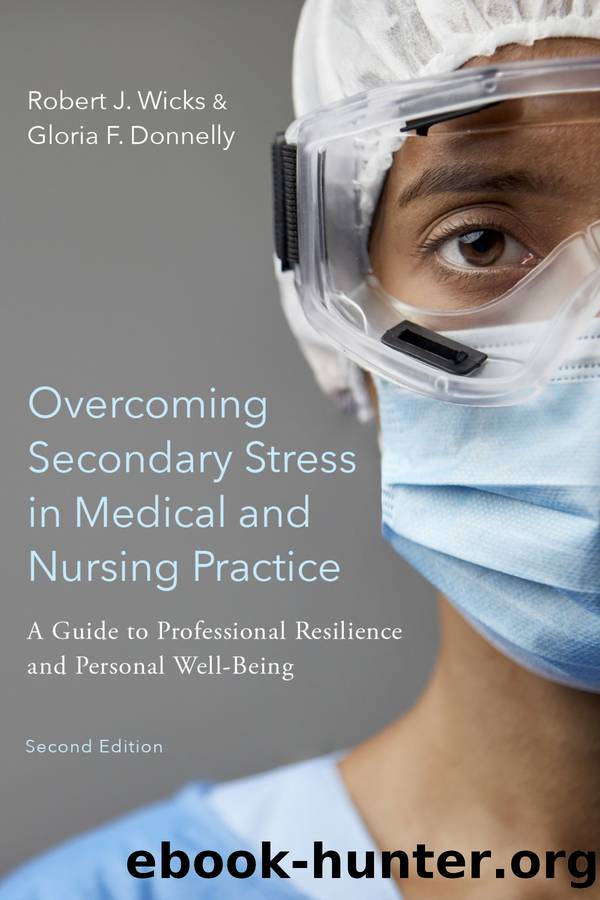Overcoming Secondary Stress in Medical and Nursing Practice by Robert J. Wicks

Author:Robert J. Wicks
Language: eng
Format: epub
Publisher: Oxford University Press
Published: 2021-02-15T00:00:00+00:00
Box 3.3 Medical/Nursing Professional Secondary Stress Self-Awareness Questionnaire
Instructions: Find a quiet, comfortable, and private place. Read each question and respond on a separate sheet of paper by writing the first thing that comes to mind. Once you have completed a page, do not turn back to it or refer to it when working on succeeding questions. Work as quickly as you can without setting a pace that is too stressful.
1. What is the reason you believe denial is so prevalent in the clinical settings with respect to stress for medical and nursing personnel? What are the most common lies you tell yourself about your own stress?
2. At this point, what are the most realistic and helpful steps you can take to prevent, limit, and learn from stress?
3. What have you heard are some excellent approaches to reducing stress and improving self-care but you feel are unrealistic in your case? What would it take to make them realistic? (âA miracle!â is not an acceptable answer.)
4. When you think of the terms burnout, compassion fatigue, and chronic secondary stress, what do you think of in terms of your own life?
5. What are the issues that make you most anxious? What are the ones you deal with the best?
6. What are the types of situations or interactions from the past that still haunt you?
7. Given the realistic demands of work and family, what would it take to balance these two areas in your life a bit more? (List only those steps that can be realistically taken by you within the next 2 to 3 years.)
8. In your own case, what helps you to fall prey to the common masochistic tenet? âThe only worthy medical or nursing professional is the one involved enough to be on the edge of burnout or physical fatigue.â
9. In what ways did your professional schooling, clinical rotations, modeling by supervisors/teachers, and initial work after graduation inadvertently teach you that taking care of yourself is a sign of weakness and that an unhealthy lifestyle is the price of being in the field of health care?
10. What are the âbad habitsâ of the people you observe in your profession that you do not want to emulate? How are you seeking to embrace the wonder, passion, and intense involvement in medicine and nursing without also absorbing the pathological side of the profession?
11. When you are under a great deal of stress, what fantasies do you have? What do you think are healthy fantasies you should act upon some day? What are the unhealthy ones that, if acted upon, would cause you and others harm?
12. What elements that are currently in your self-care protocol have been most beneficial for you? What are the least helpful? Do you have a self-care protocol?
13. What do you struggle with most in your efforts to take care of yourself? Because your presence as a professional in the health care field means that de facto you are a bright and accomplished person, you would not think that these struggles should be so hard for you; why are they?
14.
Download
This site does not store any files on its server. We only index and link to content provided by other sites. Please contact the content providers to delete copyright contents if any and email us, we'll remove relevant links or contents immediately.
1610396766 (N) by Jo Ann Jenkins(1297)
Elizabeth Is Missing by Emma Healey(1231)
McGraw-Hill Nurses Drug Handbook by Patricia Schull(1185)
Cherry Ames Boxed Set, Books 1 - 4 by Helen Wells(1154)
Economics and Financial Management for Nurses and Nurse Leaders, Third Edition by Susan J. Penner RN MN MPA DrPH CNL(1147)
The Language of Kindness by Christie Watson(1118)
Cherry Ames, Student Nurse by Helen Wells(1100)
NCLEX-RN Prep Plus 2019 by Kaplan Nursing(1096)
Spiritual Midwifery by Ina May Gaskin(1080)
Whoever Tells the Best Story Wins: How to Use Your Own Stories to Communicate with Power and Impact by Annette Simmons(1057)
Cherry Ames Boxed Set, Books 5 - 8 by Helen Wells(1051)
Home. by Sarah Graham(1049)
Cracking the Nursing Interview by Jim Keogh(1025)
1476763445 by Liz Fenton(1005)
Dementia by June Andrews(928)
Getting Started with Arduino by Massimo Banzi(922)
Cherry Ames, Army Nurse by Helen Wells(899)
Shadows of the Workhouse: The Drama of Life in Postwar London by Jennifer Worth(889)
Children's Medicines by Edward A. Bell(884)
